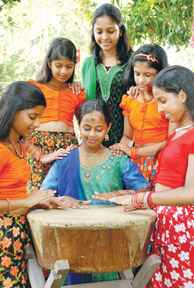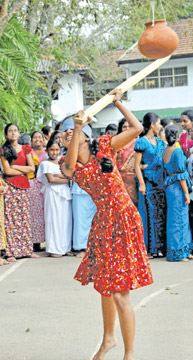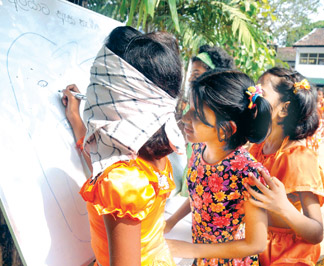|
Variety
Sinhala and Hindu New Year:
The games people play
It is no secret that the segment of society that looks forward most
to any festival are the children because of the customary sweetmeats,
fun and games associated with it. And so, most of you must be eagerly
counting the days to the dawn of the Sinhala and Hindu New Year as it is
one of the many festivals rife in fun and games not counting out the
mouth watering traditional sweet meats you can sink your teeth into.
When it comes to entertainment, all barriers are generally broken and
ideally the forthcoming cultural festival is a platform to bridge all
differences and frolic. There are many traditional games people play
during the festive season and more often than not they start before the
dawn of the New Year and continues till long after. The sound of
crackers, raban and joyous laughter , especially of children mingles
with the melodious call of the koel during the season.
 Everyone loves to engage in the various traditional games which are
held in different parts of the country,especially in villages once all
the traditional activities are observed at auspicious times There are a
host of traditional games that are associated with this national event. Everyone loves to engage in the various traditional games which are
held in different parts of the country,especially in villages once all
the traditional activities are observed at auspicious times There are a
host of traditional games that are associated with this national event.
They include both indoor and outdoor games and sports. If we look at
the traditional indoor games what do you think is popular? Boardgames of
course! Foremost among them are the board games such as the olinda
keliya, pancha and daam (draughts).
As there are many who are keen on enjoying themselves playing modern
games during this time instead of the traditional ones, games such as
cards,carom,chess,ludo,cards and monopoly that have been introduced to
the country by the Colonial rulers have also been added.
The traditional outdoor games include swinging,(onchili padeema)
playing raban (drum beating), playing chak gudu and tachchi .It is a
popular practice to decorate the swings which take an important and
integral place in the festivities. It is mostly women folk who enjoy
themselves on the swings and traditionally they recite special verses,
which are known as 'varang kavi (swing songs).
Playing the drum or rabana is also mostly done by elderly women who
have a great time entertaining the people with their skills at playing
it .
Most of you must have seen the huge rabana which is also called the
bench rabana used during the New Year season or on other national
occasions. The large rabana is supported on four wooden legs about a
foot in height. The players, mainly woman, about four in number, sit
around the drum and play in unison, using their hands only.
 The rhythmic beating of the drum or ,raban pada are played by the
women who sit around it. Very often the the drumming is accompanied by
the singing of verses which indicate the beat that has to be played.
Competitive playing is common among women ; one player, plays a beat
which the other has to replicate. The rhythmic beating of the drum or ,raban pada are played by the
women who sit around it. Very often the the drumming is accompanied by
the singing of verses which indicate the beat that has to be played.
Competitive playing is common among women ; one player, plays a beat
which the other has to replicate.
There are instances, when men too, take part, especially those who in
their own right, play the drums, equally well. The drum is heated before
the session begins,so that it will give a melodious tone when beaten.
There are games such as chak gudu and thachchi which are fast
disappearing during New Year time. Throwing coins on to an erect board
is another game which is usually played for stakes. Space permitting
games such as hopscotch,volleyball,badminton and soft ball cricket are
also popular non traditional games both children and adults engage in
during the festive season.
Climbing the greasy pole is another popular New Year sport which
provides real entertainment to both contestants and onlookers.
In addition to these, informal traditional and non- traditional games
played informally, in compounds and open spaces are organised. Many new
items such as beauty queen contests, fancy dress competitions, pillow
fighting, tug o´war and various kinds of races such as bicycle, cross
country, lime and spoon, obstacle, sack, three legged races are included
to give the festivities a national flavour and also to attract adults.
Competitions in coconut scraping, weaving of coconut fronds, reciting
verses are now common during the New Year celebrations.
What is special when it comes to the games played during the festive
season is that very often, the whole family joi ns in. Under normal
circumstances, throughout the year, the parents have no time to join
their children, playing games. But New Year changes this pattern.
 Two competitive games that are much looked forward to by the children
as they generally keep them in fits of laughter are marking the eye of
the elephant in the correct place and the breaking of a hanging pot by
hitting it with a stick while the the contestants are blindfolded. Two competitive games that are much looked forward to by the children
as they generally keep them in fits of laughter are marking the eye of
the elephant in the correct place and the breaking of a hanging pot by
hitting it with a stick while the the contestants are blindfolded.
Hook tagging (Angkeliya) and coconut striking (Pora Pol) are two
games that have religious overtones. They are held to invoke the
blessings of Goddess Pattini . When playing angkeliya the village is
divided into two sections along a water way or some such natural or man
made boundary.Two teams are identified as 'Yati Pila' and 'Udu Pila'. A
suitable spot is chosen,very often under a large spreading ironwood,
banyan or Bo tree.
The arena is cleaned and the boundary is marked with young coconut
fronds hanging from coir rope.
The origin of this sport was a tussle between Pattini and Palanga,
when they were plucking sapu flowers. The two hooks got entangled and
when they tugged, Palanga's hook gave way and Pattini won.
In pora pol two types of coconuts are needed: one in the shape of a
rugger ball and having a very hard shell, the other a normal round one.
A coconut is thrown at a contestant in the opposite side.
The opponent uses a coconut to crack or chip the oncoming coconut.
The ultimate winning side is the one that has the least number of
chipped coconuts.These games go on for a week laced by nature's
contribution to the Sinhala and Hindu New Year festivities, in the form
of the koel's call and the sweet fragrance of the bright red flowers
Erabadu (in Sinhala) and Munmurukku (Tamil) . |

